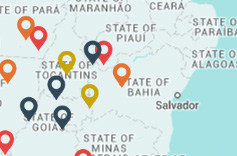Land, Work and Citizenship Institute – ITTC
Alternatives to the provisional detainment of women: developing strategies to implement the Bangkok rules in the Brazilian context
São Paulo
Objetivos e público prioritário
Promoting alternatives to the provisional detainment of women in Brazil, with special attention given to pregnant women and those responsible for the care of their families, such as smaller children, the disabled or dependent relatives. Through research, data will be published about the application of cautionary measures (circumscribed in Law 12.403 from 2011) to women imprisoned provisionally in the judicial district of São Paulo.
Main activities
– Quantitative and qualitative research, using criminal cases taken from the Central Court of São Paulo (Barra Funda Criminal Court), the State Justice System and one of the Subsections of the Federal Justice System in São Paulo; a seminar to discuss preliminary results;
– Creation of a website, production of a video and publicity concerning the theme on social networks on the internet;
– Advocacy with legal professionals;
– Debates including civil society and specialists on the results attained and action strategies.
Context
According to the National Penitentiary Department (DEPEN), there are more than 35,000 incarcerated, detained or sentenced women in Brazil, and of these, 12,674 are in São Paulo (2012). The majority of female inmates were charged with non-violent crimes, mostly drug trafficking or theft (80%).
Generally, when men are imprisoned, they know that their children are with their mother, and when they leave prison, they can go back to their homes and their family. Women, however, know that their children usually are not with their father, but with the mother’s family, friends, neighbors or, sometimes, in State custody. The incarceration of women (more than 80% of whom are mothers) increases the social vulnerability of their children. The penitentiary structure, conceived by men for men, fails to contemplate the possibility of housing pregnant or nursing women, nor attend to other specific needs of women.
Active on this theme since 2010, the ITTC participated in the elaboration of the United Nations Rules for the treatment of women prisoners and measures not involving the privation of liberty for women offenders (the Bangkok Rules). The international document was based on the recognition of the social inequality women are relegated to due to gender discrimination and all forms of violence associated with it.
Despite the Brazilian Government having participated actively in the elaboration of the Bangkok Rules, until now they haven’t been incorporated into the country’s public policies. The only translation of the document into Portuguese was done by the Prison Pastoral and wasn’t even officially recognized by Brazil.
About the organization
Since its inception the ITTC has been dedicated to the defense of the rights of imprisoned women and men, with an emphasis on the gender inequalities that are perpetuated and multiplied within the prison system. The organization considers the imprisonment and punitive regimes in the contemporary world to be part of a social policy that is an affront to Human Rights, believing the revision of this model to be a matter of urgency. Prison, understood to be an institution in violation of Human Rights, must be monitored by civil society, a role we embody attentively. The monitoring and multiplying of information inside of prison units for prisoners and workers are mechanisms of struggle for the humanization and fulfillment of the rights guaranteed to all.
Partnerships
National Prison Pastoral, Brazilian Association in Defense of Women, Childhood and Youth (ASBRAD), the Public Defender of the State of São Paulo and the Federal Public Defender.
Results
The ITTC developed communication strategies and advocacy with the purpose of establishing dialog spaces and partnerships with strategic players in government, especially the National Penitentiary Department (DEPEN) and the National Council of Justice. Political advocacy activities were carried out both in São Paulo and Brasília, taking aim at the discussion of issues related to provisional detainment and female imprisonment (such as hearings regarding custody, torture and ending the practice of keeping handcuffs on during childbirth). Besides the final research report, throughout the project printed informational material was produced. Inserts in print media, TV and radio about the topic were also results of the project. Another result was the recognition of the ITTC’s technical capacity to integrate spaces for formulating public policy regarding alternative forms of punishment. The research on women’s provisional detainment focused mainly on the justice system’s responsibility and incorporating gender data into the judicial dynamics.
See the microsite Women Without Prison (in Portuguese).
Funding Line
Criminal Justice / Rio de Janeiro e São Paulo (2014)
Year
-
Total Granted
R$ 258,200
Duration
24 months
Main Themes
Guaranteeing the rule of law and criminal justice






